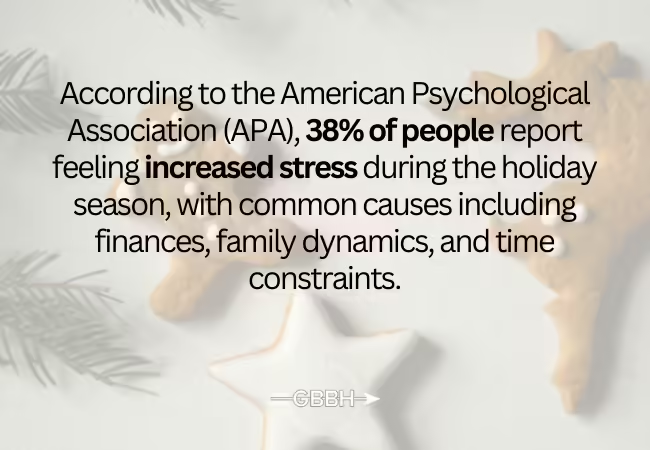The holidays are often portrayed as a joyful time filled with love and connection. However, for many people, the season can also bring stress, anxiety, and emotional strain, particularly when family dynamics are challenging. Whether it’s unresolved conflicts, differing expectations, or a packed schedule, family-related holiday stress is a common issue. This guide explores strategies to maintain your mental health and enjoy the holiday season without feeling overwhelmed, with insights from the Mental Health Therapy Programs at Greater Boston Behavioral Health.
Understanding Holiday Stress
Holiday stress often stems from a combination of factors, including:
- High expectations for harmony and joy.
- Financial pressures related to gifts and travel.
- Past conflicts or unresolved family tensions.
- Over commitment to social gatherings and family events.
These stressors can exacerbate existing mental health conditions like anxiety or depression. Programs like Cognitive Behavioral Therapy (CBT) and Dialectical Behavioral Therapy (DBT) can help individuals identify and manage the thought patterns contributing to holiday stress.
Holiday Stress: Common Triggers and Emotional Impact
The holiday season, while often viewed as a time of joy and connection, can also be a source of significant stress. Common triggers include financial pressure, busy schedules, and the emotional challenges of family dynamics. Social expectations to create “perfect” celebrations and the cultural emphasis on togetherness can amplify feelings of inadequacy, guilt, or loneliness.
For individuals already managing mental health conditions, such as anxiety or depression, these stressors can exacerbate symptoms. The emotional impact of holiday stress may include irritability, difficulty sleeping, mood swings, or physical symptoms like headaches and fatigue. Recognizing these triggers is the first step in preventing holiday stress from taking a toll on your mental health.
Practical Tips to Reduce Holiday Stress
1. Set Boundaries
Establishing boundaries is essential to protect your mental health.
- Communicate clearly about how much time you can spend with family and the activities you feel comfortable participating in.
- Remember, it’s okay to say no. Overextending yourself can lead to burnout and resentment.
2. Focus on What You Can Control
You can’t change others’ behavior, but you can control how you respond to it.
- Practice mindfulness techniques to stay grounded during tense situations.
- Engage in self-care, such as taking breaks or attending a yoga session to reset your mindset.
3. Address Family Conflicts with Care
If unresolved conflicts resurface, approach them with compassion.
- Use tools from Anger Management programs to remain calm and avoid escalation.
- Consider having a neutral family member mediate discussions if needed.
4. Manage Expectations
Let go of the idea of a “perfect” holiday.
- Recognize that no family is without flaws, and it’s okay if the holiday doesn’t go exactly as planned.
- Focus on creating small moments of joy and connection rather than meeting unrealistic standards.
The Role of Mental Health Programs in Coping
Professional support can be invaluable for navigating holiday stress.
- Family Therapy Programs: Address and resolve long-standing issues in a safe, structured environment.
- Group Therapy Programs: Connect with others experiencing similar challenges and share coping strategies.
- Intensive Outpatient Programs (IOP): Provide ongoing support for individuals managing stress, anxiety, or depression during the holidays.
These services help individuals build resilience and develop strategies for managing stress effectively.
How to Recognize Signs of Holiday-Induced Mental Health Struggles
Holiday stress doesn’t always announce itself loudly. It often manifests subtly, making it crucial to recognize the signs:
- Increased Irritability: Feeling easily frustrated or snapping at others.
- Fatigue: Constant exhaustion despite resting or sleeping.
- Loss of Interest: A lack of enthusiasm for activities you usually enjoy.
- Avoidance: Skipping social events or family gatherings to avoid stress.
- Physical Symptoms: Headaches, muscle tension, or digestive issues linked to stress.
- Worsened Anxiety or Depression: Escalating feelings of sadness, hopelessness, or worry.
If these symptoms persist or intensify, it may be time to seek support from mental health professionals through programs like Cognitive Behavioral Therapy (CBT) or Group Therapy Programs.
Healthy Communication Strategies for Family Gatherings
Navigating family gatherings can be one of the most stressful aspects of the holidays, especially when unresolved conflicts or misunderstandings exist. Here are some strategies to maintain healthy communication:
- Set Clear Expectations: Communicate your availability and boundaries in advance to avoid over commitments.
- Use “I” Statements: Express feelings without blaming others. For example, say, “I feel overwhelmed when…” instead of “You always…”
- Practice Active Listening: Show empathy by truly listening to others without immediately preparing a response.
- De-escalate Tensions: If conflicts arise, take a moment to pause, breathe, and suggest revisiting the discussion later.
- Seek Neutral Ground: Avoid polarizing topics and focus on shared memories or neutral conversation topics.
The Importance of Self-Care During the Holidays
1. Prioritize Your Mental Health
The holidays are a time for giving, but you can’t pour from an empty cup.
- Schedule time for activities that bring you peace, such as reading, exercising, or journaling.
- Make use of techniques learned in CBT or DBT to handle overwhelming emotions.
2. Limit Alcohol and Caffeine
Both substances can exacerbate anxiety and interfere with sleep. Opt for healthier alternatives to maintain your mental and physical well-being.
3. Stay Active
Physical activity reduces stress and boosts mood. Even a short walk or yoga session can have a significant impact.

The Role of Mental Health Programs During the Holidays
Mental health programs provide a lifeline for those struggling to navigate the emotional demands of the season. Here’s how they can help:
- Intensive Outpatient Programs (IOP): Offer ongoing support and coping strategies for managing holiday-related stress and existing mental health conditions.
- Partial Hospitalization Programs (PHP): Provide structured care for individuals needing more intensive support while still living at home.
- Family Therapy Programs: Help families work through conflicts and develop healthier communication patterns.
- Group Therapy Programs: Create a space to share experiences and learn from others facing similar challenges.
When to Seek Professional Help
If holiday stress becomes unmanageable or triggers deeper issues, consider seeking professional help.
- Persistent feelings of sadness, hopelessness, or anger may indicate underlying mental health concerns.
- Programs like Depression Treatment and Anxiety Treatment offer targeted support to address these challenges.
Greater Boston Behavioral Health provides a range of services, including Partial Hospitalization Programs (PHP) and Intensive Outpatient Programs (IOP), to help individuals manage stress and improve their mental health during challenging times.
Conclusion
The holidays don’t have to be a source of stress and tension. By setting boundaries, managing expectations, and focusing on self-care, you can create a joyful and peaceful season. For those needing extra support, Greater Boston Behavioral Health offers comprehensive Mental Health Therapy Programs, including Family Therapy, Group Therapy, and Cognitive Behavioral Therapy, to help you thrive through the holidays and beyond. Call us at (888)278-0716 today to learn more about our services and how we can help you on your journey to recovery!
FAQ on Happy Holidays Without the Family Stress
Why is the holiday season stressful for many people?
The holiday season can be stressful due to financial pressures, packed schedules, unresolved family conflicts, and high expectations for perfection. These factors often amplify existing mental health challenges, making it difficult to fully enjoy the season.
How can I set healthy boundaries during holiday gatherings?
Communicate your availability clearly and prioritize your mental well-being. Use respectful language to decline invitations or limit your time at events. Remember, setting boundaries is a form of self-care.
What are common signs of holiday-induced mental health struggles?
Signs include increased irritability, fatigue, avoidance of social activities, physical symptoms like headaches, and worsening anxiety or depression. These indicators suggest it may be time to seek professional support.
How can mental health programs help during the holidays?
Mental health programs, such as Intensive Outpatient Programs (IOP) or Family Therapy, offer structured support to address holiday stress, improve coping skills, and resolve family conflicts. They provide a safe space to navigate emotional challenges.
What are effective communication strategies for family events?
Use “I” statements to express your feelings, actively listen to others, and avoid polarizing topics. If tensions arise, take breaks or suggest addressing issues at a later time.

